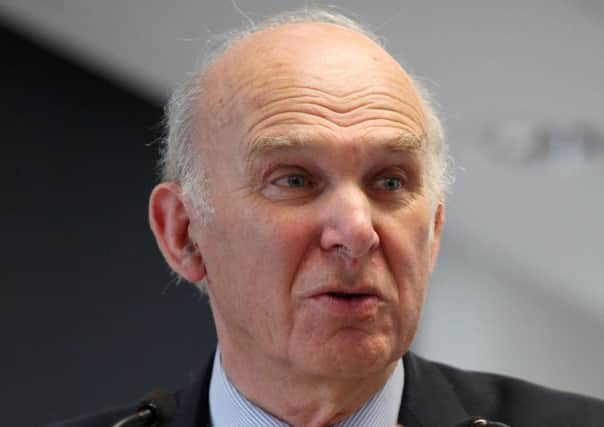Scottish independence: Firms may decamp - Cable


In a keynote speech in Glasgow yesterday, Mr Cable said it was “very difficult to see how major financial institutions could continue to operate” in an independent Scotland if First Minister Alex Salmond pursued his plan to retain sterling under independence despite Chancellor George Osborne ruling out a formal currency union.
Mr Cable claimed institutions such as Royal Bank of Scotland and Lloyds would consider leaving Scotland in search of a lender of last resort if an independent Scotland used the pound in an informal currency union with no protection from the Bank of England. His warning at Glasgow University yesterday follows pensions giant Standard Life suggesting it would shift its operation south of the Border if Scots vote Yes on 18 September.
Advertisement
Hide AdAdvertisement
Hide AdMr Cable said uncertainty about independence was having a “chilling effect” on investment in businesses and jobs.
He went on to say that the rest of the UK would be in a “very much wealthier position” than an independent Scotland and warned that major banks would consider moving their operations south of the Border in search of the financial stability offered by the Bank of England’s control of monetary policy.
Scotland would be a “country with a substantially more challenging financial position” than the rUK after a Yes vote.
Mr Cable said: “It is simply not in a position to offer a credible facility and this applies in particular to Scottish banks which have assets totalling around 1,250 per cent of an independent Scotland’s GDP. The jibe about a small country with a big bank attached has practical consequences. The inevitable consequence, now being openly talked about, is that large financial institutions would decamp to the continuing UK.”
He said firms such as Standard Life were as concerned about the prospect of Scottish independence as overseas banks. Mr Cable said: “Just as worrying is the fact that RBS and Lloyds [which incorporates the Bank of Scotland] have had to enter Scottish independence in their risk registers.
“All of these factors, taken together, suggest significant business costs, or at least uncertainties, around the economics of Scotland’s independence – with corresponding implications for jobs. What, however, matters more than politicians’ interpretations of the evidence is the reaction from business.
“A growing list are now stating their intention to consider relocating from Scotland in the event of independence: financial services companies worried about future regulatory safeguards (Standard Life, the Alliance Trust in Dundee); multinational companies concerned about the costs of maintaining separate head office operations and the business environment more generally (BP and Shell); Clydeside military shipbuilding; Scottish companies concerned about the overall impact on investment and competitiveness like Aggreko and the Weir Group, which first spoke up two years ago.
“The feedback that I get is that there is a very strong sense that they get the business case for the Union and are increasingly concerned about the consequences of it going the other way. We’ll get more of that. There is a chilling effect and it’s creating uncertainty in a really difficult overall economic situation. There is significant uncertainty over the future of the UK and I suspect some businesses will hold fire until they are absolutely sure.”
Advertisement
Hide AdAdvertisement
Hide AdMr Cable, speaking to the media later, said: “It has to be set against the basic requirement of any company of how do you protect yourself in the event of a financial emergency. It’s very difficult to see how major financial institutions would continue to operate under a system that gets into trouble.”
Addressing the series of interventions by business leaders warning they would consider leaving Scotland after a Yes vote, he said: “I would have thought they would be required to make quick decisions.
“It’s a gaping hole in the case for independence.”